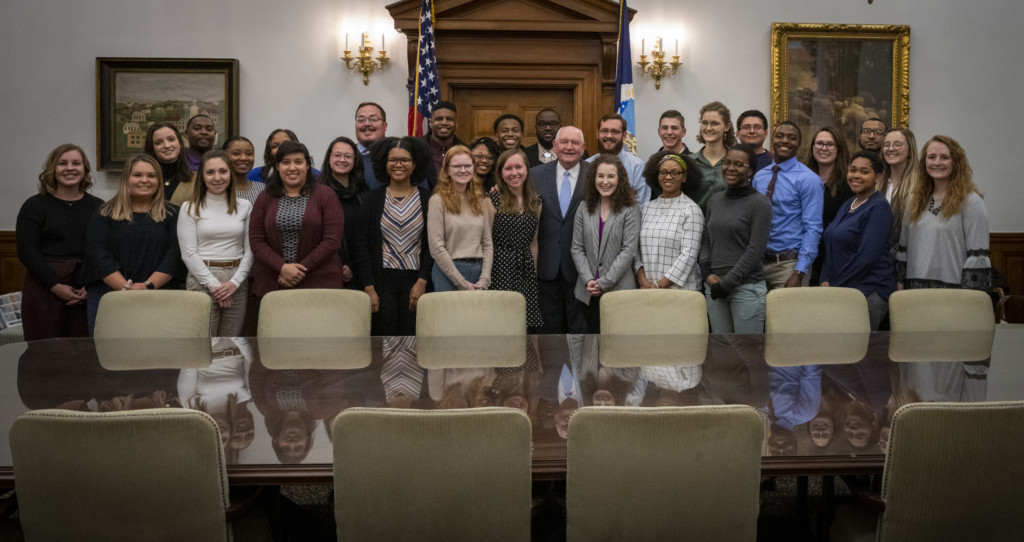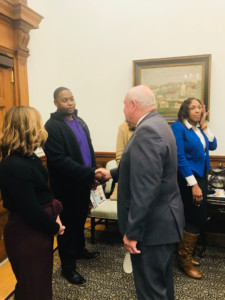PRAIRIE VIEW, Texas (April 16, 2020) – Livestock, poultry, and…politics?
While most folks might struggle to find a connection between the three, for Prairie View A&M University Agriculture Major Christopher Jennings, the combination makes perfect sense.
After hearing about the opportunity from Horace D. Hodge, PVAMU’s USDA/1890 Program Liaison, Jennings applied to be part of the USDA Agricultural Outlook Forum as a participant of the USDA Future Leaders in Agriculture Program.
The forum has been held since 1924, and is a unique opportunity to gain insights into the more political aspects of agriculture.
Originally started as a way to communicate the year’s forecast to farmers in the field, the event has grown to become a prestigious event attended by a wide variety of experts.

U.S. Department of Agriculture Secretary Sonny Perdue meets with college students who are participants in the “Future Leaders” program at USDA in Washington, D.C., on February 18, 2020. USDA Photo by Tom Witham.
On The Hill
The forum was held in Washington, D.C. this past February, where Jennings quickly impressed fellow attendees.
“Chris has been a delight to work with – as has each PVAMU student who came before him,” USDA Program Analyst Lisa Purnell said in an email to Hodge.
She continued with a brief anecdote, “Today, we are on The Hill meeting with the Senate Ag Committee. Without knowing it, Chris is sitting in the Chairman’s seat. The staff was quick to inform him that he must be destined for great things – I agree!”
With so many influential politicians and agriculture experts in the same place, the forum was also a unique opportunity for networking.
“The most exciting part about the program was shaking hands with the Secretary of Agriculture, Sonny Perdue. This is the person I’ve always seen on the Cowboy Channel! I never thought I would meet him, so I truly felt honored to do so. We took pictures together and it was nothing short of memorable. I don’t believe in fairytales, but this felt magical,” said Jennings.
Of the many agricultural topics featured at the event, one, in particular, caught his interest.
“As a proud animal science major, I couldn’t wait for the livestock and poultry discussion,” Jennings explained. “My curiosity of the industry and economic trends could be satisfied.”
In the Lab
In addition to satisfying his curiosity, the forum provided Jennings with extensive insights about the outlook in his field.
“Now, more than ever, there’s demand for lower processed foods. The markets are transitioning toward more natural products, such as grass-fed beef, poultry produced with no antibiotics, and the list goes on,” he said of the forecasts. “Production is steadily increasing; that’s a positive sign of future advancement and opportunity.”
While it’s always exciting to hear things are looking up, he’s more than aware of the political considerations that need to be taken into account, especially for funding research.
“Limited funding caused student assistantships in research to be cut,” Jennings said about the financial realities of shifting policies. “Although, with the latest Farm Bill passed in 2018, I’ve seen a change. The bill added $80 million in scholarship funds for HBCU [Historically Black Colleges/Universities] students studying disciplines like farming and agribusiness. With this increase, I believe my academic endeavors would have been accomplished more quickly.”
Jennings’ studies cover a wide variety of techniques and technologies to help farmers increase production and yield without straining their resources.
From investigating how to prevent diseases in livestock and crops, to developing farming methods to reduce pesticide use, there’s plenty of advancements to be made, so long as the funding is available.
“In academics, knowledge is king, but in the political world, finances are queen,” Jennings quipped.
Feeding the Future
Being able to see how politics, research, and farmers impact the agricultural ecosystem has reinforced Jennings’ dedication to his work.
“The most important thing people should know about agriculture is that it’s a community,” he explained, “from the local farmer and farmer’s markets, to high schoolers raising animals in FFA [Future Farmers of America], we are in the community to make a difference. Agriculture is more than a job dealing with food; it is an everlasting service to ensure we feed America and the world.”
He’s also excited to continue learning and expanding his network at events.
“My focus in the field of animal science is strong as ever. With dedication and hard work, I know for a fact that this won’t be my last time attending the Agricultural Outlook Forum,” he said.
Considering how far he’s come already, there’s no doubt that will hold true.
Since 2007, the USDA has hosted undergraduate and graduate students at the forum, and PVAMU has had at least one or more students selected to participate each year.
###
By Marley Crusch

